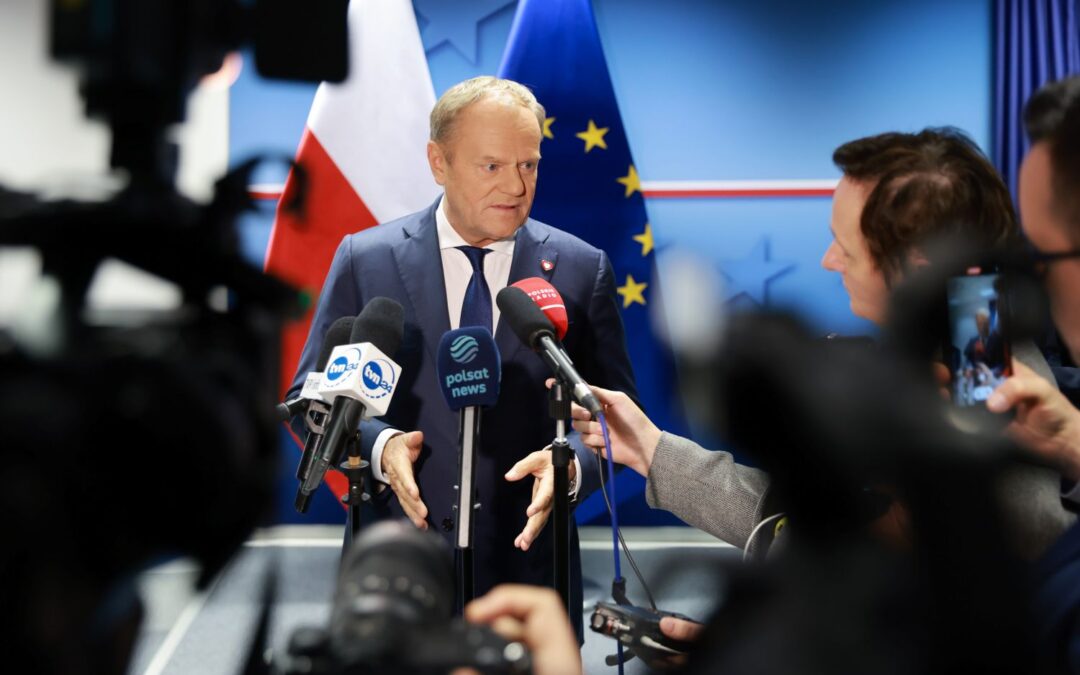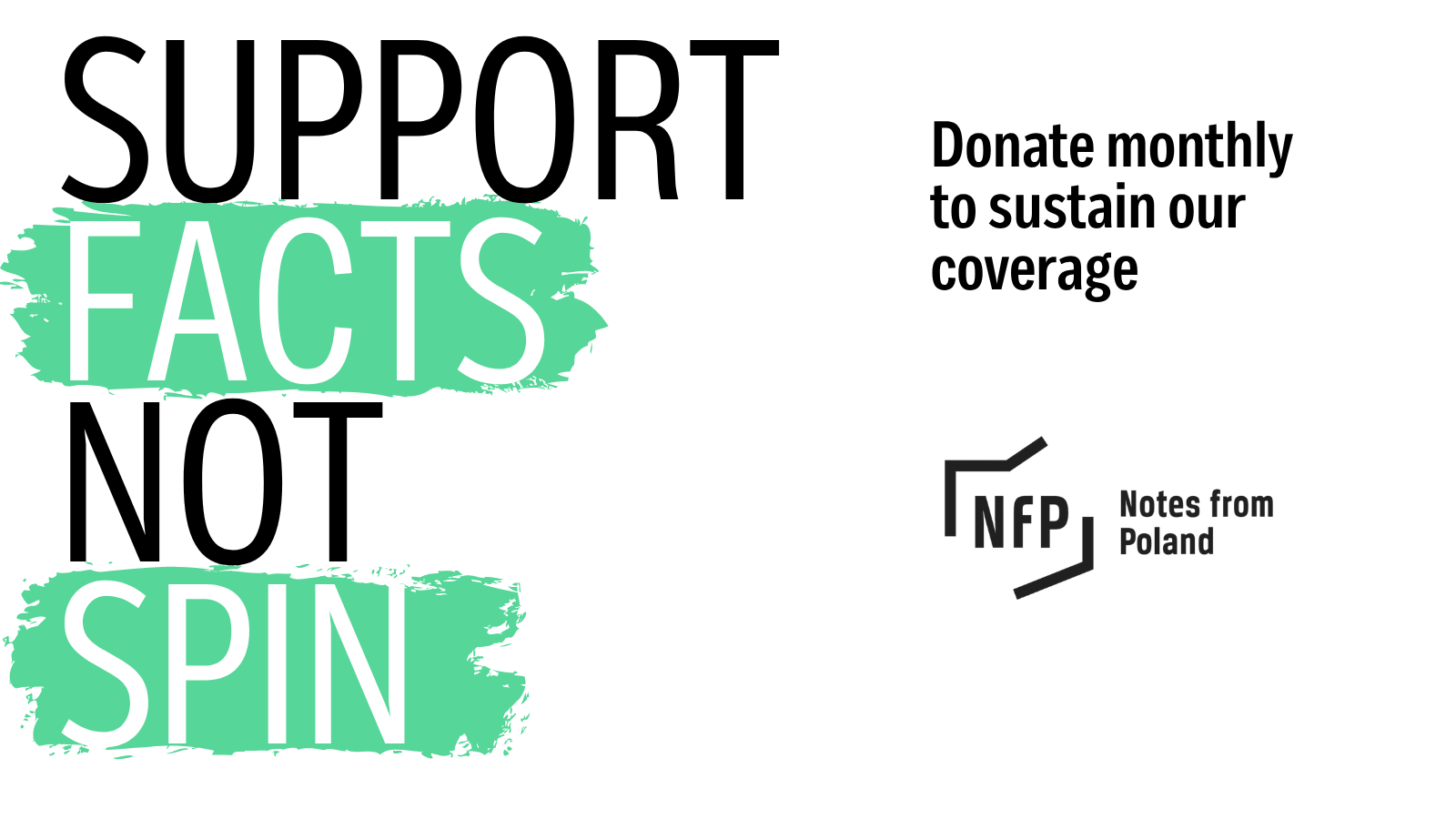Keep our news free from ads and paywalls by making a donation to support our work!

Notes from Poland is run by a small editorial team and is published by an independent, non-profit foundation that is funded through donations from our readers. We cannot do what we do without your support.
Prime Minister Donald Tusk has sparked controversy after reportedly saying, in an interview with a British newspaper, that if major reform of the European Convention on Human Rights (ECHR) is not undertaken, then it would be reasonable to withdraw from it.
In particular, Tusk criticised the fact that the ECHR is often used to prevent the deportation of foreign criminals. His remarks sparked criticism from human rights groups and legal experts, but a government spokesman later clarified that there are no plans to withdraw from the convention.
The Polish PM feels ‘bitter satisfaction’ that his years of warnings about Russia and the ‘extremely ordinary’ Putin have been vindicated https://t.co/5Zj95dLfx5
— The Times and The Sunday Times (@thetimes) October 26, 2025
Tusk made the remarks during an interview with The Sunday Times, published at the weekend, in which he discussed the migration crisis and Europe’s response to it.
“When we are talking about the biggest threats, maybe not for Poland, but first of all, for the West, and for the EU as a whole, it is migration,” said Tusk, whose government last year launched a tough new migration strategy that included suspending the right to asylum for migrants who irregularly cross the border.
There are “more and more difficult ethnic and cultural relations inside our societies — not in Poland, maybe, but for sure in your country, in France, in Germany”, added the Polish prime minister.
Tusk identified one of the key problems as the ECHR. Countries want to “deport convicted criminals, rapists or terrorists”, but sometimes “it is impossible because of these very traditional verdicts from the courts that human rights are much more important than security”.
Tusk said he had spoken the day before with his Italian and Danish counterparts, Giorgia Meloni and Mette Frederiksen, about reform of the convention. “I’ve been very blunt and even brutal with my colleagues. We cannot wait for these changes. We have to act now.”
The Sunday Times then wrote – though here it was not quoting Tusk – that he is “sympathetic to the more radical answer proposed by the Reform and Conservative parties in the UK: if the 46 signatories to the convention cannot agree on how to modernise it, he said, it is quite reasonable to think about simply leaving it”.
A court has ruled that Poland's recently introduced partial suspension of the right to asylum is justified and lawful.
It rejected a complaint by a Sudanese man who had been denied the right to claim asylum after crossing irregularly from Belarus https://t.co/jx3s1AxRgG
— Notes from Poland 🇵🇱 (@notesfrompoland) October 10, 2025
Those comments sparked a backlash from human rights groups in Poland. The Helsinki Foundation for Human Rights (HFHR) criticised Tusk’s remarks, calling them “astonishing and concerning.”
“Even if they are considered a strictly political statement, rather than a serious call to allow withdrawal from the convention, they may have very negative consequences,” wrote HFHR. “They lead to the normalisation of arguments and slogans that have, until now, been associated with extremist and populist movements.”
Monika Gąsiorowska, a Warsaw human rights lawyer, meanwhile, warned that withdrawal from the convention would align Poland with countries such as Russia, which left in 2022 following its invasion of Ukraine.
“I would advise the prime minister to familiarise himself with the values and goals of the founders of the Council of Europe and what the convention was intended to protect against,” she told TVN24. “This is a matter of historical knowledge, which, as a historian, the prime minister should possess.”
W wypowiedzi dla gazety „Sunday Times” premier @donaldtusk Donald Tusk miał z pełnym zrozumieniem odnieść się do postulatu wyjścia z Europejskiej Konwencji Praw Człowieka, jeśli nie zostanie ona poddana reformie, gdyż w obecnej sytuacji przedkłada ona prawa człowieka nad… pic.twitter.com/3HWNm2nSWC
— Helsińska Fundacja Praw Człowieka (@hfhrpl) October 27, 2025
However, asked by broadcaster TVN to clarify Tusk’s comments, government spokesman Adam Szłapka said that there are not any plans to withdraw Poland from the ECHR.
Szłapka also told another outlet, news website Wirtualna Polska, that “the prime minister’s words did not refer to Poland, but were a response to a question posed by British journalists concerning the ongoing discussion in the UK”.
Earlier this year, Tusk joined eight other European leaders in calling for a “conversation” on the interpretation of the European Convention on Human Rights, arguing that it should allow more flexibility for countries to expel foreign criminals and prevent “hostile states instrumentalising migrants.”
Poland and eight other EU countries have called for a “conversation about the interpretation of the European Convention on Human Rights” to make it easier to expel foreign criminals and stop “hostile states instrumentalising migrants” https://t.co/JTb79SuXXP
— Notes from Poland 🇵🇱 (@notesfrompoland) May 26, 2025

Notes from Poland is run by a small editorial team and published by an independent, non-profit foundation that is funded through donations from our readers. We cannot do what we do without your support.
Main image credit: KPRM (under CC BY-NC-ND 3.0 PL)

Alicja Ptak is deputy editor-in-chief of Notes from Poland and a multimedia journalist. She has written for Clean Energy Wire and The Times, and she hosts her own podcast, The Warsaw Wire, on Poland’s economy and energy sector. She previously worked for Reuters.




















